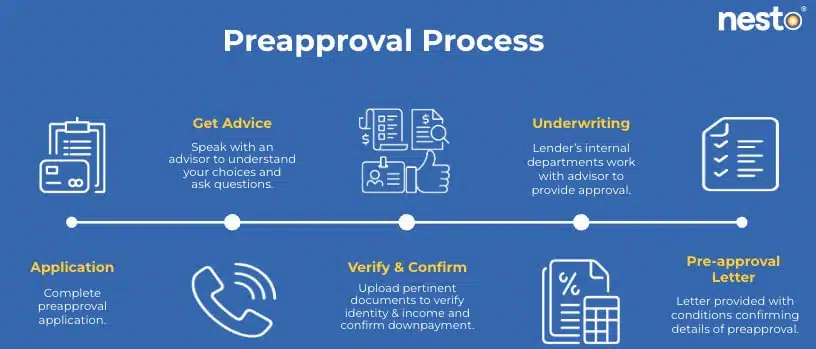First-Time Home Buyer Mortgage Guide

Becoming a homeowner for the first time is a significant milestone, and it all starts with understanding the basics. From mortgage types to government incentives, this guide covers everything you need to know to navigate the homebuying process confidently.
Key Takeaways
- You can buy a home with just 5% down using programs like the FHSA or HBP.
- A mortgage pre-approval helps you budget and strengthens your offer.
- Picking the right mortgage means looking beyond just the interest rate.
What Is a First-Time Home Buyer?
To be considered a first-time homebuyer (FTHB) in Canada, you must not have owned or lived in a home you or your spouse/common-law partner owned within the last 4 years. Exceptions apply for those going through separation or divorce. The definition of a first-time buyer may vary depending on other programs, such as the CMHC, GST rebate, FHSA or RRSP Home Buyer’s Plan, and provincial land transfer tax rebates.
First-Time Buyer Mortgage Basics
A mortgage is a loan used to purchase a property, secured by the home itself. You’ll need to pay it back over 25 or 30 years, with interest amortized over that time. Amortizing your loan allows you to pay a portion of your interest and principal over the life of your home loan.
Types of Mortgages
- Fixed-rate: The rate remains unchanged for the entire mortgage term.
- Variable-rate: The rate fluctuates with the prime rate.
- Open vs. Closed: An open mortgage allows full repayment without penalties, whereas a closed mortgage comes with limited prepayment privileges.
- Standard vs. Collateral Charge: A standard charge has registered terms and conditions; a collateral charge, on the other hand, can secure multiple mortgage loans and other credit facilities within a single registered charge.
Down Payment Rules
Minimum down payment requirement:
- 5% for homes under $500,000
- 10% for the portion over $500,000 up to $1.5 million
- 20% for homes $1.5 million or more
A 20% down payment is not required unless the purchase price is $1.5 million or more. Saving more than 20% doesn’t always guarantee a better rate.
Tools to Boost Your Down Payment
- Home Buyers’ Plan (HBP): Withdraw up to $60,000 from RRSP, you’ll have up to 15 years to pay it back into your RRSP.
- First Home Savings Account (FHSA): Save up to $40,000 tax-free; contributions are tax-deductible.
Beginning your home journey?
Start with a low rate.
Chat with a nesto expert today, commission-free, and secure your rate.
Mortgage Default Insurance
Mortgage default insurance is required for down payments under 20% and offered through CMHC, Sagen, or Canada Guaranty. The premium is 2.8% to 4% of the mortgage, and if PST is required, depending on your province, it cannot be added to the mortgage.
A premium surcharge of 0.20% will be applied to qualified first-time homebuyers who choose the increased 30-year amortization option.
Mortgage default insurance lets you qualify with lower credit scores and can help you get better mortgage rates.
How Much Mortgage Can I Afford?
Debt-to-income (DTI) ratios help mortgage lenders help assess your mortgage affordability.
- GDS (Gross Debt Service): Max 39% of gross income
- TDS (Total Debt Service): Max 44% of gross income
Use nesto’s Affordability Calculator to check how much mortgage you can qualify for.
Mortgage Pre-Approval in 5 Steps
- Mortgage Application: Submit financial info, and a tentative subject property address will be required.
- Get Advice: Work with a mortgage expert to clarify your financial situation and gain a deeper understanding.
- Verify Info: Provide required mortgage documents (ID, income, debts).
- Underwriting: The lender assesses your credit risk through the mortgage underwriting process and may adjust the loan amount accordingly.
- Pre-Approval Letter: Confirms mortgage amount, terms and conditions, and rate hold if applicable.
Why Getting a Mortgage Preapproval Matters
A pre-approval helps you avoid wasting time or risking your deposit by making offers on homes you can’t afford.

Understanding the Mortgage Stress Test
All buyers must pass a mortgage stress test to show they can carry their monthly payments at a higher rate:
- The greater of your rate + 2% OR
- The Bank of Canada benchmark (currently 5.25%)
Use nesto’s Mortgage Payment Calculator to model your stress-tested payments.
Choosing Your Mortgage Term & Amortization
- Term: 6 months to 10 years (5-year term is most popular).
- Amortization: Max 25 years with <20% down, up to 30 years otherwise.
- FTHB: 30-year amortizations are open to all first-time home buyers, even if you put less than 20% down.
- Newly Built Homes: 30-year amortizations are available to anyone purchasing a newly built home, but a 20% down payment is required if not a First-Time Home Buyer (FTHB).
More extended amortization periods lower monthly payments but increase your total interest-carrying costs.
We’re curious…
Are you a first-time buyer?
Closing Costs for First-Time Buyers
| Item | Cost Range |
|---|---|
| Deposit | $5,000–$50,000 |
| Land Transfer Tax | Varies by province (rebates available) |
| Legal Fees | $1,000–$3,000 |
| Appraisal | $300–$500 |
| Title Insurance | ~$300 |
| Mortgage Default Insurance | 2.8%–4% of mortgage, 0.20% surcharge for amortizations over 30 years |
| PST on Insurance | 6%–9% (in QC, ON, SK) |
| GST/HST | On new homes only |
| Home Inspection | $500–$1,500 |
| Utility Hookups | $150–$300 per service |
| Property Taxes & Adjustments | Prorated, based on closing date |
Government Incentives and Rebates
| Program | Benefit |
|---|---|
| First-Time Home Buyers’ Tax Credit | Up to $1,500 tax relief |
| GST/HST New Housing Rebate | Refund on federal tax for new builds |
| HBP (RRSP Withdrawal) | Up to $60,000 tax-free |
| FHSA (New Account) | Save up to $40,000 tax-free |
| Land Transfer Tax Rebates | ON – up to $4,000 BC – up to $8,000 PEI – up to $2,000 Toronto – up to $4,475 Montreal – up to $15,000 |
Working With Mortgage Experts vs. Banks
Banks offer mortgages directly, but their staff are generalists. Mortgage brokers (or licensed professionals) specialize in matching borrowers with mortgage lenders and solutions. They can help with rate negotiation, pre-approvals, and complex files.
Mortgage rates vary based on:
- Credit score, history and profile
- Down payment size
- Property and location
- Insurability status assessed through your loan-to-value (LTV) ratio
Choosing Fixed vs. Variable Mortgage Rates
Deciding between a fixed vs. variable mortgage depends on your personal risk profile. Consider:
- Fixed: Stable, predictable, good for budgeting
- Variable: May save money if rates drop, but riskier if rates rise
First-time buyers often benefit from starting with a fixed-rate mortgage, as it allows them to get accustomed to their new monthly obligations.
Avoiding Common First-Time Buyer Mistakes
- Skipping pre-qualification or pre-approval
- Forgetting about closing costs
- Buying based on emotion, not budget
- Overestimating what you can afford
- Choosing a mortgage rate without understanding penalties or other limitations
Frequently Asked Questions (FAQ) for FTHB Mortgages in Canada
Can I buy a home without a down payment in Canada?
No, you will need a down payment of at least 5%. Programs like FHSA or RRSP withdrawals through the Home Buyer’s Plan can help you save for your goal.
What credit score is required to qualify for a mortgage?
A credit score of 680 or higher is ideal, but mortgage default insurance may be available with lower scores.
Can I use more than one incentive to purchase my first home?
Yes, you can combine FHSA, HBP, LTT rebates, and other incentives to purchase your first home.
Can I use more than one incentive to purchase my first home?
Yes. Your real estate lawyer or notary will handle the closing, title search, and mortgage registration.
Final Thoughts
Purchasing your first home can be complex, but it doesn’t have to feel overwhelming. With the proper guidance and support, you can navigate the process with clarity and confidence. nesto’s commission-free mortgage experts are available to help you compare rates, evaluate your financing options, and move forward toward homeownership with a clear plan.
Are you ready to take the first step towards homeownership? Connect with a nesto mortgage expert today and let’s get you home.
Why Choose nesto
At nesto, our commission-free mortgage experts, certified in multiple provinces, provide exceptional advice and service that exceeds industry standards. Our mortgage experts are salaried employees who provide impartial guidance on mortgage options tailored to your needs and are evaluated based on client satisfaction and the quality of their advice. nesto aims to transform the mortgage industry by providing honest advice and competitive rates through a 100% digital, transparent, and seamless process.
nesto is on a mission to offer a positive, empowering and transparent property financing experience – simplified from start to finish.
Contact our licensed and knowledgeable mortgage experts to find your best mortgage rate in Canada.
First-Time Home Buyer Guides
- What is the First-Time Home Buyers’ Tax Credit?
- What is the RRSP Home Buyers’ Plan (HBP)?
- First-Time Home Buyer Land Transfer Tax Rebates Across Canada
- First-Time Home Buyer Programs in Canada
- First-Time Home Buyer Grants in Canada
- First-Time Home Buyer Loans in Canada
- Who Can Benefit From the Home Buyers’ Tax Credit (HBTC)?
Ready to get started?
In just a few clicks, you can see our current rates. Then apply for your mortgage online in minutes!



